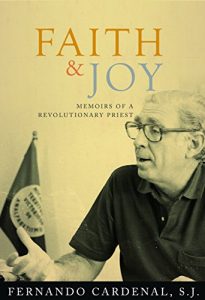Fernando Cardenal, a Nicaraguan Jesuit priest, oversaw a national literacy campaign and served as Minister of Education in the revolutionary Sandinista government in the 1980s. The Sandinista revolution was unusual for the wide participation of Christians in the struggle. However, the role of priests in the revolutionary government (including Fernando’s brother, Ernesto Cardenal, a famous poet), was a source of bitter controversy with the Vatican. When he declined to resign his government post (judging that it would be “a grave sin if I were to abandon my priestly option for the poor”), Cardenal was suspended from the priesthood and expelled from the Society of Jesus.
Underlying this dramatic story is the deep sense of vocation, which inspired Cardenal’s commitment to the poor, his decision to join the revolutionary struggle, and his work within the revolution to instill values of self-sacrifice, generosity, and love. When he later became disillusioned by the corruption of certain party leaders, these same values prompted his break with the Sandinistas.
Fernando Cardenal, a Nicaraguan Jesuit priest, oversaw a national literacy campaign and served as Minister of Education in the revolutionary Sandinista government in the 1980s. The Sandinista revolution was unusual for the wide participation of Christians in the struggle. However, the role of priests in the revolutionary government (including Fernando’s brother, Ernesto Cardenal, a famous poet), was a source of bitter controversy with the Vatican. When he declined to resign his government post (judging that it would be “a grave sin if I were to abandon my priestly option for the poor”), Cardenal was suspended from the priesthood and expelled from the Society of Jesus.
Underlying this dramatic story is the deep sense of vocation, which inspired Cardenal’s commitment to the poor, his decision to join the revolutionary struggle, and his work within the revolution to instill values of self-sacrifice, generosity, and love. When he later became disillusioned by the corruption of certain party leaders, these same values prompted his break with the Sandinistas.
Fernando Cardenal, a Nicaraguan Jesuit priest, oversaw a national literacy campaign and served as Minister of Education in the revolutionary Sandinista government in the 1980s. The Sandinista revolution was unusual for the wide participation of Christians in the struggle. However, the role of priests in the revolutionary government (including Fernando’s brother, Ernesto Cardenal, a famous poet), was a source of bitter controversy with the Vatican. When he declined to resign his government post (judging that it would be “a grave sin if I were to abandon my priestly option for the poor”), Cardenal was suspended from the priesthood and expelled from the Society of Jesus.
Underlying this dramatic story is the deep sense of vocation, which inspired Cardenal’s commitment to the poor, his decision to join the revolutionary struggle, and his work within the revolution to instill values of self-sacrifice, generosity, and love. When he later became disillusioned by the corruption of certain party leaders, these same values prompted his break with the Sandinistas.
Underlying this dramatic story is the deep sense of vocation, which inspired Cardenal’s commitment to the poor, his decision to join the revolutionary struggle, and his work within the revolution to instill values of self-sacrifice, generosity, and love. When he later became disillusioned by the corruption of certain party leaders, these same values prompted his break with the Sandinistas.
Fernando Cardenal, a Nicaraguan Jesuit priest, oversaw a national literacy campaign and served as Minister of Education in the revolutionary Sandinista government in the 1980s. The Sandinista revolution was unusual for the wide participation of Christians in the struggle. However, the role of priests in the revolutionary government (including Fernando’s brother, Ernesto Cardenal, a famous poet), was a source of bitter controversy with the Vatican. When he declined to resign his government post (judging that it would be “a grave sin if I were to abandon my priestly option for the poor”), Cardenal was suspended from the priesthood and expelled from the Society of Jesus.
Underlying this dramatic story is the deep sense of vocation, which inspired Cardenal’s commitment to the poor, his decision to join the revolutionary struggle, and his work within the revolution to instill values of self-sacrifice, generosity, and love. When he later became disillusioned by the corruption of certain party leaders, these same values prompted his break with the Sandinistas.
Fernando Cardenal, a Nicaraguan Jesuit priest, oversaw a national literacy campaign and served as Minister of Education in the revolutionary Sandinista government in the 1980s. The Sandinista revolution was unusual for the wide participation of Christians in the struggle. However, the role of priests in the revolutionary government (including Fernando’s brother, Ernesto Cardenal, a famous poet), was a source of bitter controversy with the Vatican. When he declined to resign his government post (judging that it would be “a grave sin if I were to abandon my priestly option for the poor”), Cardenal was suspended from the priesthood and expelled from the Society of Jesus.
Underlying this dramatic story is the deep sense of vocation, which inspired Cardenal’s commitment to the poor, his decision to join the revolutionary struggle, and his work within the revolution to instill values of self-sacrifice, generosity, and love. When he later became disillusioned by the corruption of certain party leaders, these same values prompted his break with the Sandinistas.






